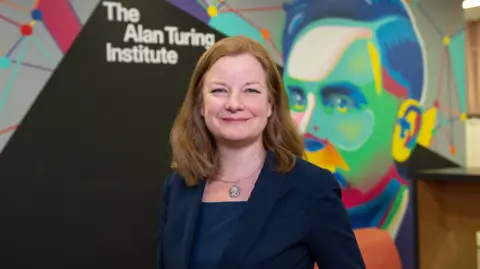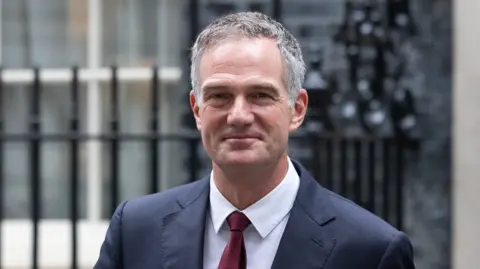Graham FraserExpertise reporter
 Alan Turing Institute
Alan Turing InstituteThe chief govt of the UK’s nationwide institute for synthetic intelligence (AI) has resigned following workers unrest and a warning the charity was liable to collapse.
Dr Jean Innes mentioned she was stepping down from the Alan Turing Institute because it “completes the present transformation programme”.
Her place has come beneath stress after Expertise Secretary Peter Kyle demanded the centre change its focus to defence and threatened to drag its funding if it didn’t – resulting in workers discontent and a whistleblowing complaint submitted to the Charity Commission.
Dr Innes, who was appointed chief govt in July 2023, mentioned the time was proper for “new management”.
In response to the resignation, a spokesperson from the Division for Science, Innovation and Expertise mentioned: “The know-how secretary has been clear on the necessity for the institute to ship worth for cash and most impression for taxpayers, and we’ll proceed our work to assist that ambition.”
Employees who wrote the whistleblowing criticism have informed the BBC Dr Innes’ resignation was the “first step”.
“With the remainder of our £100m public funding nonetheless at stake, the precedence now could be to make sure the management overhaul that ought to observe – board and govt alike – can command the arrogance of workers, authorities, regulators and, most significantly, the nation,” they mentioned.
The Turing Institute mentioned its board was now trying to appoint a brand new CEO who will oversee “the subsequent section” to “step up its work on defence, nationwide safety and sovereign capabilities”.
Its work had as soon as targeted on AI and information science analysis in environmental sustainability, well being and nationwide safety, however moved on to different areas equivalent to accountable AI.
The federal government, nevertheless, wished the Turing Institute to make defence its essential precedence, marking a major pivot for the organisation.
“It has been a terrific honour to steer the UK’s nationwide institute for information science and synthetic intelligence, implementing a brand new technique and overseeing vital organisational transformation,” Dr Innes mentioned.
“With that work concluding, and a brand new chapter beginning… now could be the appropriate time for brand new management and I’m enthusiastic about what it would obtain.”
What occurred on the Alan Turing Institute?
Based in 2015 because the UK’s main centre of AI analysis, the Turing Institute, which is headquartered on the British Library in London, has been rocked by inner discontent and criticism of its analysis actions.
A overview final 12 months by authorities funding physique UK Analysis and Innovation discovered “a transparent want for the governance and management construction of the Institute to evolve”.
On the finish of 2024, 93 members of workers signed a letter expressing a insecurity in its management group.
In July, Expertise Secretary Peter Kyle wrote to the Turing Institute to inform its bosses to concentrate on defence and safety.
He mentioned boosting the UK’s AI capabilities was “important” to nationwide safety and ought to be on the core of the institute’s actions – and recommended it ought to overhaul its management group to replicate its “renewed objective”.
He mentioned additional authorities funding would rely upon the “supply of the imaginative and prescient” he had outlined within the letter.
This adopted Prime Minister Sir Keir Starmer’s dedication to growing UK defence spending to five% of nationwide revenue by 2035, which would come with investing extra in navy makes use of of AI.
 Getty Photographs
Getty PhotographsA month after Kyle’s letter was despatched, workers on the Turing institute warned the charity was liable to collapse, after the risk to withdraw its funding.
Employees raised a sequence of “critical and escalating issues” in a whistleblowing criticism submitted to the Charity Fee.
Bosses on the Turing Institute then acknowledged recent months had been “difficult” for employees.
Prof Harin Sellahewa, professor of computing on the College of Buckingham, mentioned the change in course could possibly be dangerous for the charity’s future.
“It’s tough to see the Alan Turing Institute making a long-lasting impression on the world’s most urgent societal points if it limits its core actions to defence and nationwide safety, and a few chosen initiatives in setting and healthcare,” he mentioned.
“With this narrowed focus, the institute might now not be seen because the nationwide institute for AI and information science.”
Extra reporting by Zoe Kleinman



